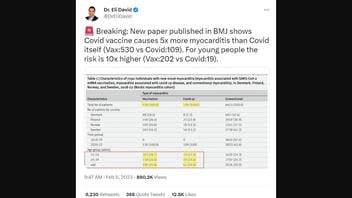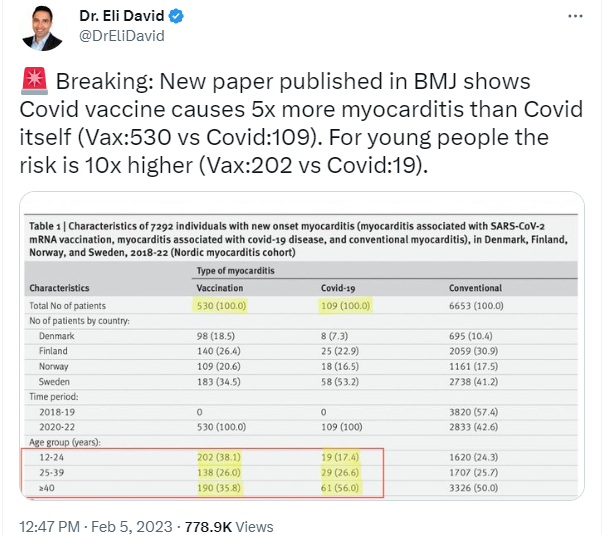Fact Check: BMJ Paper Does NOT Show COVID Vaccine Causes 5x More Myocarditis Than Virus, 10X More In Youths

Does a new paper published in BMJ Medicine show that the COVID vaccine causes five times more myocarditis than the COVID virus and 10 times more in young people? No, that’s not true: One of the study’s authors told Lead Stories in a February 6, 2023, email that it’s “an incorrect way to interpret our study.” The paper only shows the raw numbers reported for the rare heart condition, it does not provide the rates of each compared to the greater population.
The claim appeared in a post on Twitter (archived here) published by Eli David, an artificial intelligence (AI) expert, on February 6, 2023. The post says:
🚨 Breaking: New paper published in BMJ shows Covid vaccine causes 5x more myocarditis than Covid itself (Vax:530 vs Covid:109). For young people the risk is 10x higher (Vax:202 vs Covid:19).
This is what the post looked like on Twitter at the time of writing:
(Source: Twitter screenshot taken on Mon Feb 6 17:25:46 2023 UTC)
The study
David’s tweet cites a paper published in BMJ Medicine on February 1, 2023, titled “Clinical outcomes of myocarditis after SARS-CoV-2 mRNA vaccination in four Nordic countries: population based cohort study.” The paper covers a population of 23 million individuals in Denmark, Finland, Norway and Sweden. All four nations are at least 73% “fully vaccinated.”
Dr. William Schaffner, a professor of infectious diseases at Vanderbilt University Medical Center, told Lead Stories in a February 6, 2023, phone interview that the fault isn’t with the numbers in the paper but with David’s misinterpretation of them:
He’s made an elementary epidemiological error because just looking at cases doesn’t tell you anything about rates. And for that, you need a denominator. In other words, we have a bunch of cases that occurred among vaccinated persons. But, what was the denominator of vaccinated persons? We had a number of cases that occurred after disease. What was the denominator of unvaccinated persons? Well, that information is not provided. Because that wasn’t the goal of the investigation at all. They just wanted to see if you happen to get myocarditis, how well did you do afterwards, depending upon whether it came after vaccine, disease or, back in the old days, what they called conventional. So this is not a study that compares rates, frequency per 100,000.
In his email to Lead Stories, study co-author Dr. Anders Husby with Denmark’s Statens Serum Institut, concurred, saying their paper wasn’t properly interpreted by David. Husby pointed Lead Stories to the “Conclusions” section of the study, which said:
We found that myocarditis after vaccination with SARS-CoV-2 mRNA vaccines was associated with a lower risk of heart failure within 90 days of admission to hospital compared with conventional myocarditis and myocarditis after covid-19 disease. Less severe outcomes of myocarditis after vaccination were found in different subgroups, including younger patients with no predisposing comorbidities, and in both men and women. Our results suggested that the outcome of myocarditis associated with SARS-CoV-2 mRNA vaccination was less severe than for other types of myocarditis.
Bottom line: It’s better to get a milder form of myocarditis following COVID vaccination than a more severe case after getting sick with the virus. In a February 6, 2023, post to its Twitter account, the Centers for Disease Control and Prevention said:
Myocarditis after #COVID19 vaccination is rare. Heart problems are 5 times more likely after COVID-19 illness than after COVID-19 vaccination. Learn more: https://t.co/vB5hxYukU1. pic.twitter.com/wDJH6mufvK
— CDC (@CDCgov) February 6, 2023
Young men
Doctors have long known that the risk of myocarditis, while still rare, is higher among young men (ages 16-24) with the Pfizer and Moderna COVID shots. In an earlier study also co-authored by Husby, it said:
This risk should be balanced against the benefits of protecting against severe COVID-19 disease.
About Eli David
David is an AI expert but appears to have no medical background. His LinkedIn profile shows multiple degrees in computer science, including a doctorate. Schaffner told Lead Stories that it’s easy for laypersons to mislead themselves when reading studies like these and they don’t have the necessary expertise:
Concepts are the same for everybody, whether you’re a medical doctor, a Ph.D. in another discipline, or you’ve just gone to high school and sell shoes. … You look at these data. It’s a common trap, if you haven’t taken Epidemiology 101.
Husby was less forgiving in his critique of David’s interpretation of his paper on Twitter:
Unfortunately, a small minority of individuals want to distort reality to fit their own narrative, and I think this is the case here.
Additional Lead Stories fact checks related to COVID vaccines can be found here.
This article has been archived for your research. The original version from Lead Stories can be found here.



